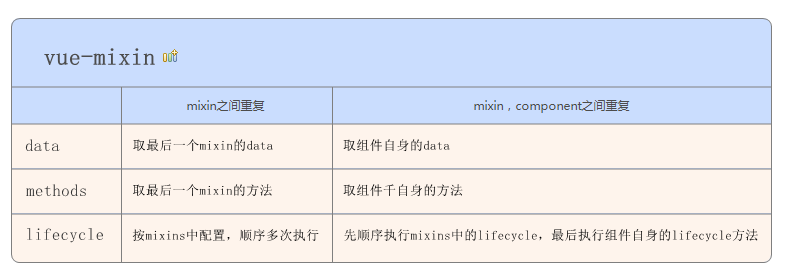为微信小程序增加mixin扩展
|
Mixin这个概念在React, Vue中都有支持,它为我们抽象业务逻辑,代码复用提供了方便。然而小程序原生框架并没直接支持Mixin。我们先看一个很实际的需求: 为所有小程序页面增加运行环境class,以方便做一些样式hack。具体说就是小程序在不同的运行环境(开发者工具|iOS|Android)运行时,platform值为对应的运行环境值("ios|android|devtools")
<view class="{{platform}}">
<!--页面模板-->
</view>
回顾vue中mixin的使用文章开始提到的问题是非常适合使用Mixin来解决的。我们把这个需求转换成一个Vue问题:在每个路由页面中增加一个platform的样式class(虽然这样做可能没实际意义)。实现思路就是为每个路由组件增加一个data: platform。代码实现如下:
// mixins/platform.js
const getPlatform = () => {
// 具体实现略,这里mock返回'ios'
return 'ios';
};
export default {
data() {
return {
platform: getPlatform()
}
}
}
// 在路由组件中使用
// views/index.vue
import platform from 'mixins/platform';
export default {
mixins: [platform],
// ...
}
// 在路由组件中使用
// views/detail.vue
import platform from 'mixins/platform';
export default {
mixins: [platform],
// ...
}
这样,在index,detail两个路由页的viewModel上就都有platform这个值,可以直接在模板中使用。 vue中mixin分类
用代码表示的话,就如:
export default {
data () {
return {
platform: 'ios'
}
},
methods: {
sayHello () {
console.log(`hello!`)
}
},
created () {
console.log(`lifecycle3`)
}
}
vue中mixin合并,执行策略如果mixin间出现了重复,这些mixin会有具体的合并,执行策略。如下图: 如何让小程序支持mixin在前面,我们回顾了vue中mixin的相关知识。现在我们要让小程序也支持mixin,实现vue中一样的mixin功能。 实现思路我们先看一下官方的小程序页面注册方式:
Page({
data: {
text: "This is page data."
},
onLoad: function(options) {
// Do some initialize when page load.
},
onReady: function() {
// Do something when page ready.
},
onShow: function() {
// Do something when page show.
},
onHide: function() {
// Do something when page hide.
},
onUnload: function() {
// Do something when page close.
},
customData: {
hi: 'MINA'
}
})
假如我们加入mixin配置,上面的官方注册方式会变成:
Page({
mixins: [platform],
data: {
text: "This is page data."
},
onLoad: function(options) {
// Do some initialize when page load.
},
onReady: function() {
// Do something when page ready.
},
onShow: function() {
// Do something when page show.
},
onHide: function() {
// Do something when page hide.
},
onUnload: function() {
// Do something when page close.
},
customData: {
hi: 'MINA'
}
})
这里有两个点,我们要特别注意:
要想让mixin中的定义有效,就要在configObj正式传给Page()之前做文章。其实Page(configObj)就是一个普通的函数调用,我们加个中间方法: Page(createPage(configObj)) 在createPage这个方法中,我们可以预处理configObj中的mixin,把其中的配置按正确的方式合并到configObj上,最后交给Page()。这就是实现mixin的思路。 具体实现具体代码实现就不再赘述,可以看下面的代码。更详细的代码实现,更多扩展,测试可以参看github
/**
* 为每个页面提供mixin,page invoke桥接
*/
const isArray = v => Array.isArray(v);
const isFunction = v => typeof v === 'function';
const noop = function () {};
// 借鉴redux https://github.com/reactjs/redux
function compose(...funcs) {
if (funcs.length === 0) {
return arg => arg;
}
if (funcs.length === 1) {
return funcs[0];
}
const last = funcs[funcs.length - 1];
const rest = funcs.slice(0, -1);
return (...args) => rest.reduceRight((composed, f) => f(composed), last(...args));
}
// 页面堆栈
const pagesStack = getApp().$pagesStack;
const PAGE_EVENT = ['onLoad', 'onReady', 'onShow', 'onHide', 'onUnload', 'onPullDownRefresh', 'onReachBottom', 'onShareAppMessage'];
const APP_EVENT = ['onLaunch', 'onShow', 'onHide', 'onError'];
const onLoad = function (opts) {
// 把pageModel放入页面堆栈
pagesStack.addPage(this);
this.$invoke = (pagePath, methodName, ...args) => {
pagesStack.invoke(pagePath, methodName, ...args);
};
this.onBeforeLoad(opts);
this.onNativeLoad(opts);
this.onAfterLoad(opts);
};
const getMixinData = mixins => {
let ret = {};
mixins.forEach(mixin => {
let { data={} } = mixin;
Object.keys(data).forEach(key => {
ret[key] = data[key];
});
});
return ret;
};
const getMixinMethods = mixins => {
let ret = {};
mixins.forEach(mixin => {
let { methods={} } = mixin;
// 提取methods
Object.keys(methods).forEach(key => {
if (isFunction(methods[key])) {
// mixin中的onLoad方法会被丢弃
if (key === 'onLoad') return;
ret[key] = methods[key];
}
});
// 提取lifecycle
PAGE_EVENT.forEach(key => {
if (isFunction(mixin[key]) && key !== 'onLoad') {
if (ret[key]) {
// 多个mixin有相同lifecycle时,将方法转为数组存储
ret[key] = ret[key].concat(mixin[key]);
} else {
ret[key] = [mixin[key]];
}
}
})
});
return ret;
};
/**
* 重复冲突处理借鉴vue:
* data, methods会合并,组件自身具有最高优先级,其次mixins中后配置的mixin优先级较高
* lifecycle不会合并。先顺序执行mixins中的lifecycle,再执行组件自身的lifecycle
*/
const mixData = (minxinData, nativeData) => {
Object.keys(minxinData).forEach(key => {
// page中定义的data不会被覆盖
if (nativeData[key] === undefined) {
nativeData[key] = minxinData[key];
}
});
return nativeData;
};
const mixMethods = (mixinMethods, pageConf) => {
Object.keys(mixinMethods).forEach(key => {
// lifecycle方法
if (PAGE_EVENT.includes(key)) {
let methodsList = mixinMethods[key];
if (isFunction(pageConf[key])) {
methodsList.push(pageConf[key]);
}
pageConf[key] = (function () {
return function (...args) {
compose(...methodsList.reverse().map(f => f.bind(this)))(...args);
};
})();
}
// 普通方法
else {
if (pageConf[key] == null) {
pageConf[key] = mixinMethods[key];
}
}
});
return pageConf;
};
export default pageConf => {
let {
mixins = [],
onBeforeLoad = noop,
onAfterLoad = noop
} = pageConf;
let onNativeLoad = pageConf.onLoad || noop;
let nativeData = pageConf.data || {};
let minxinData = getMixinData(mixins);
let mixinMethods = getMixinMethods(mixins);
Object.assign(pageConf, {
data: mixData(minxinData, nativeData),
onLoad,
onBeforeLoad,
onAfterLoad,
onNativeLoad,
});
pageConf = mixMethods(mixinMethods, pageConf);
return pageConf;
};
小结
Page(createPage(configObj))
|




